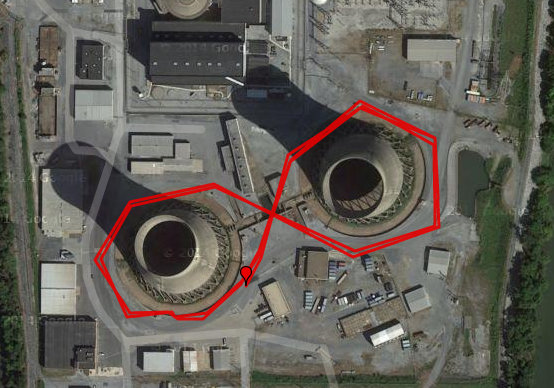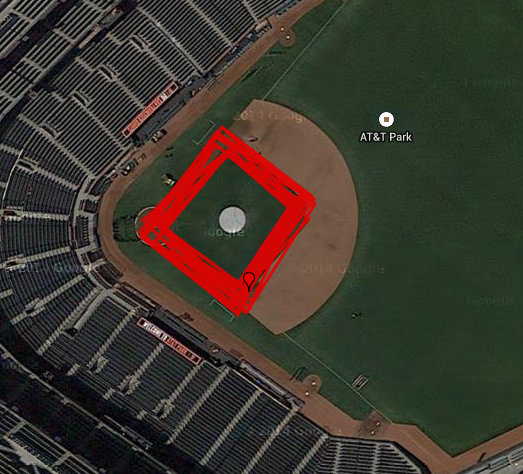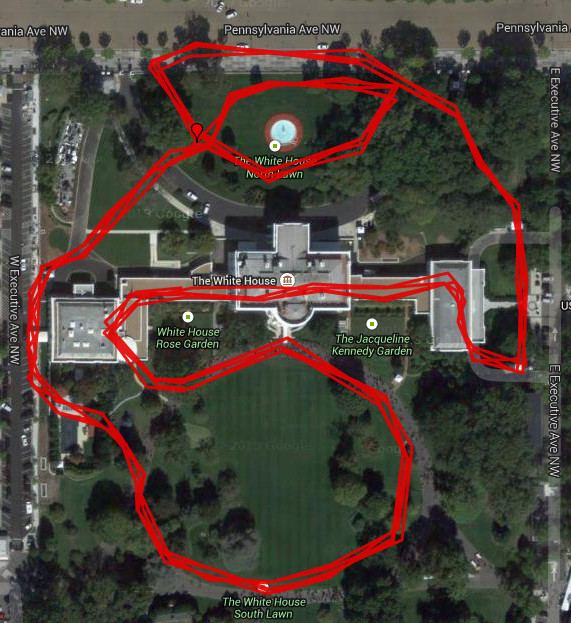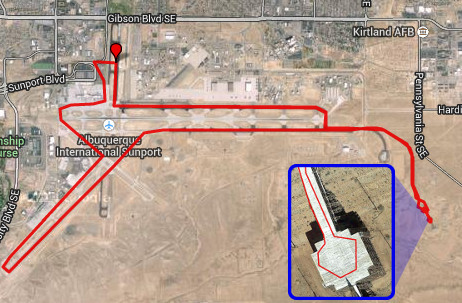Run Faker
TL;DR: It isn't that hard to use third party sites like RunKeeper to load large amounts of fake health data into Virgin Health Miles. However, it's not worth doing so, because VHM only gives you minimal credit for each track (which is the same problem most legitimate exercise activities have in VHM). I've written a python program that helps you convert KML files into fake tracks that you can upload, if you're passive aggressive and don't like the idea of some corporation tracking where you go running.

Well-Being Incentive Program
A few years back my employer scaled back our benefits, which resulted in higher health care fees and worse coverage for all employees. In consolation, they started a well being incentive program through Virgin Health Miles (VHM). It's an interesting idea because they encourage healthier behaviors by treating it as a game: an employee receives a pedometer and then earns points for walking 7k, 12k, or 20k steps in a day. The VHM website provides other ways to earn points and includes ways to compete head to head with your friends. At the end of the year, my employer looks at your total points and gives you a small amount of money in your health care spending account for each level you've completed. In theory this is a win-win for everyone. The company gets healthier employees that don't die in the office as much. Employees exercise more and get a little money for health care. VHM gets to sell their service to my employer and then gets tons of personal health information about my fellow employees (wait, what?).
As you'd expect, there are mixed feelings about the program. Many people participate, as it isn't hard to keep a pedometer in your pocket and it really does encourage you to do a little bit more. Others strongly resent the program, as it is invasive and has great potential for abuse (could my employer look at this info and use it against me, like in Gatica?). Others have called out the privacy issue.
Given the number of engineers at my work, a lot of people looked into finding ways to thwart the hardware. People poked at the usb port and monitored the data transfers upwards, but afaik, nobody got a successful upload of fake data. The most common hack people did was to just put their pedometer on something that jiggled a lot (like your kids). This was such a threat, that pedometer fraud made it into a story in the Lockeed Martin Integrity Minute (worth watching all three episodes, btw).
My Sob Story
This year I actively started doing VHM, using both a pedometer to log my steps and RunKeeper to log my bike rides. When my first few bike rides netted only 10 points, I discovered that a track of GPS coordinates did not constitute sufficient proof that I had actually exercised (!). In order to "make it real" I had to buy a Polar Heart Rate Monitor, which cost as much as the first two rewards my employer would give me in the health incentive program. I bought it, because it sounded like it would help me get points for other kinds of exercise, like my elliptical machine.
Unfortunately, RunKeeper estimates how much exercise you've done by using your GPS track to calculate your distance. Since my elliptical machine doesn't move, RunKeeper logs my heart rate data, but then reports zero calories, since I went nowhere. When I asked VHM if there was a way to count my elliptical time, they said all I could do was get 10 points for an untrusted log entry, or count the steps with my pedometer (potentially getting 60-100 points).
The pedometer was fine, but then midway through the year it died (not from going through the washing machine either). I called up VHM and they wanted $17 for a new one. I wrote my employer and asked for a spare and was told tough luck. $17 isn't much, but I'd already blown $75 on the HRM, and it all started feeling like a scam. Anything where your have to pay money to earn the right to make money just doesn't sound right, especially if its through your workplace.
Equivalent Stats
Outside of VHM, I've been keeping a log of all the different days I've exercised this year. I had the thought, wouldn't it be nice if I could upload that information in a way that would give me the points VHM would have awarded me if their interfaces weren't so terrible? What if I wrote something that could create data that looked like a run, but was actually just a proxy for my elliptical work?
I discovered that RunKeeper has a good interface for uploading data (since they just want you to exercise, after all), and that they accepted GPX and TCX formatted data files. I wrote a python script to generate a GPX track file that ran around a circle at a rate and duration that matched my elliptical runs. Since I knew VHM needed HR data, I then generated heart rate data for each point. Circles are kind of boring, so the next thing I did was add the ability to import a kml file of points and then turn it into a run. Thus, you can go to one of the many track generator map sites, drop a bunch of points, and create the route you want to run. My program uses the route as a template to make a running loop, and jiggles the data so it isn't exactly the same every time through. Fun.
A Few Sample Runs
For fun, I made a few kml template files for runs that would be difficult for people to actually do. The first one at the top of this post was a figure eight around the cooling towers at three mile island. Next, since the Giants were in the world series, I decided it would be fitting to do some laps around AT&T park.

With all the stories in the news, I thought it would be fitting to squeeze in a few laps around the White House.

And last, I (in theory) made a break for it at Kirtland AFB and went out to see the old Atlas-I Trestle (a giant wooden platform they used to toll B52s out on and EMP dose them).

Mission Aborted
I decided to abort uploading all of my proxy data for two reasons. First, even with gps and heartbeat values, VHM still only assigns 10 points for each run. I was hoping to get "activity minute" credits, which would be on the order of 60 points per run, but alas, they must have some additional check to see whether the data came from your phone or another source. This problem really emphasizes why I dislike VHM: they only acknowledge data from a small number of devices that are meant to log certain types of exercises. If you want to do something else, you're out of luck. Second, VHM's user agreement says something about not submitting fraudulent data. While I wouldn't consider uploading proxy data to be any less ethical than what people with pedometers do at the end of the data to get to the next level, I don't want them coming after me because I was trying to compensate for their poorly-built, privacy-invading system.
If someone wanted to pick this up, I'd recommend looking at the data files RunKeeper generates in its apps. I've compared "valid" routes to my "invalid" ones, and I don't see any red flags why the invalid ones would be rejected upstream. I suspect RunKeeper passes on some info about where the data originated, which VHM uses to reject tracks that didn't come from the app.
Code
I've put my code up on GitHub for anyone that wants to generate their own fake data. It isn't too fancy, it just parses the kml file to get a list of coordinates, and then generates a track with lon/lat/time values to simulate a run based on the template. It uses Haversine to compute the distance between points so it can figure out how much time it takes to go between them at a certain speed.